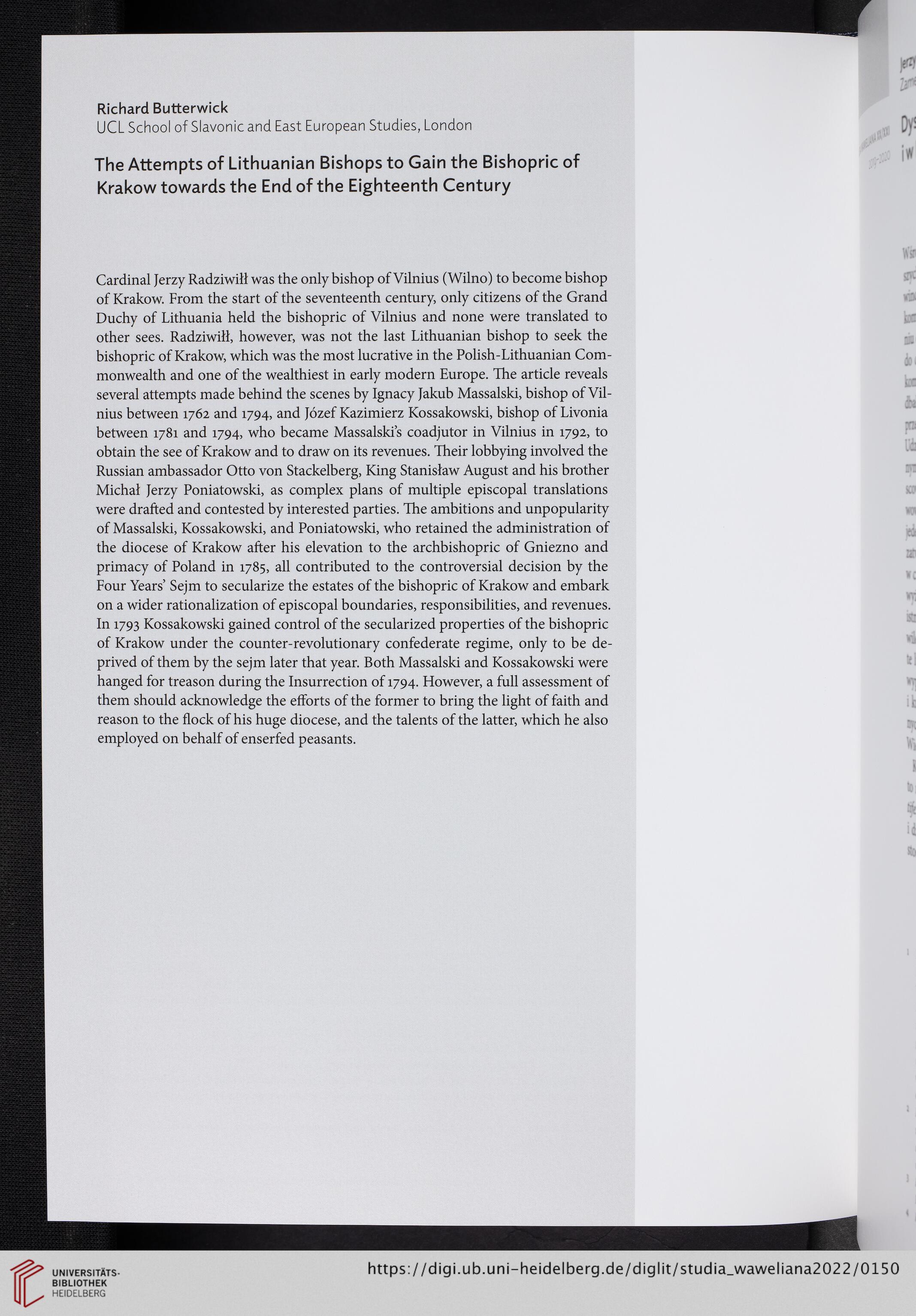Richard Butterwick
UCL School of Slavonic and East European Studies, London
The Attempts of Lithuanian Bishops to Gain the Bishopric of
Kraków towards the End of the Eighteenth Century
Cardinal Jerzy Radziwiłł was the only bishop of Vilnius (Wilno) to become bishop
of Kraków. From the start of the seventeenth century, only citizens of the Grand
Duchy of Lithuania held the bishopric of Vilnius and nonę were translated to
other sees. Radziwiłł, however, was not the last Lithuanian bishop to seek the
bishopric of Kraków, which was the most lucrative in the Polish-Lithuanian Com-
monwealth and one of the wealthiest in early modern Europę. The article reveals
several attempts madę behind the scenes by Ignacy Jakub Massalski, bishop of Vil-
nius between 1762 and 1794, and Józef Kazimierz Kossakowski, bishop of Livonia
between 1781 and 1794, who became Massalskis coadjutor in Vilnius in 1792, to
obtain the see of Kraków and to draw on its revenues. Their lobbying involved the
Russian ambassador Otto von Stackelberg, King Stanisław August and his brother
Michał Jerzy Poniatowski, as complex plans of multiple episcopal translations
were drafted and contested by interested parties. The ambitions and unpopularity
of Massalski, Kossakowski, and Poniatowski, who retained the administration of
the diocese of Kraków after his elevation to the archbishopric of Gniezno and
primacy of Poland in 1785, all contributed to the controversial decision by the
Four Years Sejm to secularize the estates of the bishopric of Kraków and embark
on a wider rationalization of episcopal boundaries, responsibilities, and revenues.
In 1793 Kossakowski gained control of the secularized properties of the bishopric
of Kraków under the counter-revolutionary confederate regime, only to be de-
prived of them by the sejm later that year. Both Massalski and Kossakowski were
hanged for treason during the Insurrection of 1794. However, a fuli assessment of
them should acknowledge the efforts of the former to bring the light of faith and
reason to the flock of his huge diocese, and the talents of the latter, which he also
employed on behalf of enserfed peasants.
UCL School of Slavonic and East European Studies, London
The Attempts of Lithuanian Bishops to Gain the Bishopric of
Kraków towards the End of the Eighteenth Century
Cardinal Jerzy Radziwiłł was the only bishop of Vilnius (Wilno) to become bishop
of Kraków. From the start of the seventeenth century, only citizens of the Grand
Duchy of Lithuania held the bishopric of Vilnius and nonę were translated to
other sees. Radziwiłł, however, was not the last Lithuanian bishop to seek the
bishopric of Kraków, which was the most lucrative in the Polish-Lithuanian Com-
monwealth and one of the wealthiest in early modern Europę. The article reveals
several attempts madę behind the scenes by Ignacy Jakub Massalski, bishop of Vil-
nius between 1762 and 1794, and Józef Kazimierz Kossakowski, bishop of Livonia
between 1781 and 1794, who became Massalskis coadjutor in Vilnius in 1792, to
obtain the see of Kraków and to draw on its revenues. Their lobbying involved the
Russian ambassador Otto von Stackelberg, King Stanisław August and his brother
Michał Jerzy Poniatowski, as complex plans of multiple episcopal translations
were drafted and contested by interested parties. The ambitions and unpopularity
of Massalski, Kossakowski, and Poniatowski, who retained the administration of
the diocese of Kraków after his elevation to the archbishopric of Gniezno and
primacy of Poland in 1785, all contributed to the controversial decision by the
Four Years Sejm to secularize the estates of the bishopric of Kraków and embark
on a wider rationalization of episcopal boundaries, responsibilities, and revenues.
In 1793 Kossakowski gained control of the secularized properties of the bishopric
of Kraków under the counter-revolutionary confederate regime, only to be de-
prived of them by the sejm later that year. Both Massalski and Kossakowski were
hanged for treason during the Insurrection of 1794. However, a fuli assessment of
them should acknowledge the efforts of the former to bring the light of faith and
reason to the flock of his huge diocese, and the talents of the latter, which he also
employed on behalf of enserfed peasants.




